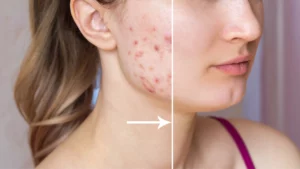The health and appearance of our skin are extremely important, and healthy skin helps us look and feel our best. Understanding what kind of skin we have and how to properly care for it can be difficult. But knowing what type of skin we have can help us get the best results when it comes to preventing and treating common skin problems.
There are five basic skin types: Normal, Oily, Dry, Combination, and Sensitive. Each type has its own distinct qualities and requires special attention and care.
Normal Skin: Normal skin looks and feels smooth and healthy. Usually, it is not prone to breakouts, nor does it require a lot of special attention or care. If you have normal skin, you generally don’t experience a lot of issues like acne or dryness. If you do, however, it’s best to consult a dermatologist to get a proper diagnosis.
People with oily skin typically create more sebum than people with normal skin do. Blemishes and pimples may result from this extra sebum. It’s crucial to routinely cleanse the skin to avoid breakouts if you have oily skin because this condition might lead to bigger pores that are more prone to clogging. Aside from being more prone to sunburn, oily skin also produces more oils than normal.
People with dry skin typically have a rough, scaly texture because their skin lacks moisture. People with dry skin frequently experience tightness and discomfort, and they are more likely to develop wrinkles and fine lines. A moisturizer made for dry skin should be used to keep the skin hydrated.
Skin Combination: it is a mix of dry and oily. People with combination skin may have oily areas, such as the T zone (forehead, nose, and chin) and dry areas, such as the cheeks. It’s important to use different products on different areas of the face, depending on the skin type in that area.
Sensitive Skin: People with sensitive skin are prone to irritation, redness, and reactions to products. These reactions can be caused by environmental factors such as pollution, sun exposure, weather changes, and certain products. It’s important to use products that are specifically formulated for sensitive skin and to avoid products that contain fragrances and harsh ingredients.
How do you know your skincare?
The best way to know your skincare is to consult with a dermatologist or skin care specialist to determine your skin type and recommended skin care regimen. Additionally, research and read reviews about the products that you are considering, listen to word-of-mouth recommendations and compare the ingredients in different products to determine which best meets your needs.
Caring for Your Skin
Once you’ve figured out your skin type, you can start to properly care for your skin. Each skin type comes with its own special needs, and it’s important to use the right products and techniques to ensure that your skin is healthy and free of any problems.
Normal Skin: Those with normal skin should use a gentle cleanser to remove dirt and sweat and to reduce bacteria. A good moisturizer is also important to keep the skin hydrated and to reduce the appearance of wrinkles. Sunscreen should also be used daily to protect the skin from harmful UV rays.
Oily Skin: People with oily skin should use a cleanser designed for oily skin to help reduce sebum production and unclog pores. A light moisturizer should be used to keep the skin balanced without being overly oily. It’s also important to use sunscreen daily to protect the skin from sun damage.
Dry Skin: Dry skin should be cleansed with a gentle cleanser and moisturized with a cream that is specifically formulated for dry skin. Those with dry skin should also use sunscreen daily to protect against UV rays and sunburn.
Combination Skin: People with combination skin should use separate products for oily areas and dry areas. A gentle cleanser should be used to remove dirt and oils, and a moisturizer should be used to hydrate the dry areas and reduce the appearance of wrinkles. Sunscreen should be used daily on all areas of the skin.
Sensitive Skin: People with sensitive skin should use a gentle, non-irritating cleanser to reduce the chance of skin reactions. A moisturizer should be used to keep sensitive skin hydrated and help reduce wrinkles and fine lines. It’s also important to use sunscreen specifically designed for sensitive skin, as this will reduce the risk of any adverse skin reactions.
In general, a healthy skin routine consists of cleansing, moisturizing, and using sunscreen as needed. It’s important to use products specifically designed to suit your skin type and to consult a doctor or dermatologist if you experience any skin issues. Knowing your skin type is the key to achieving healthy, glowing skin, so make sure you understand your skin and give it the attention and care it needs.







